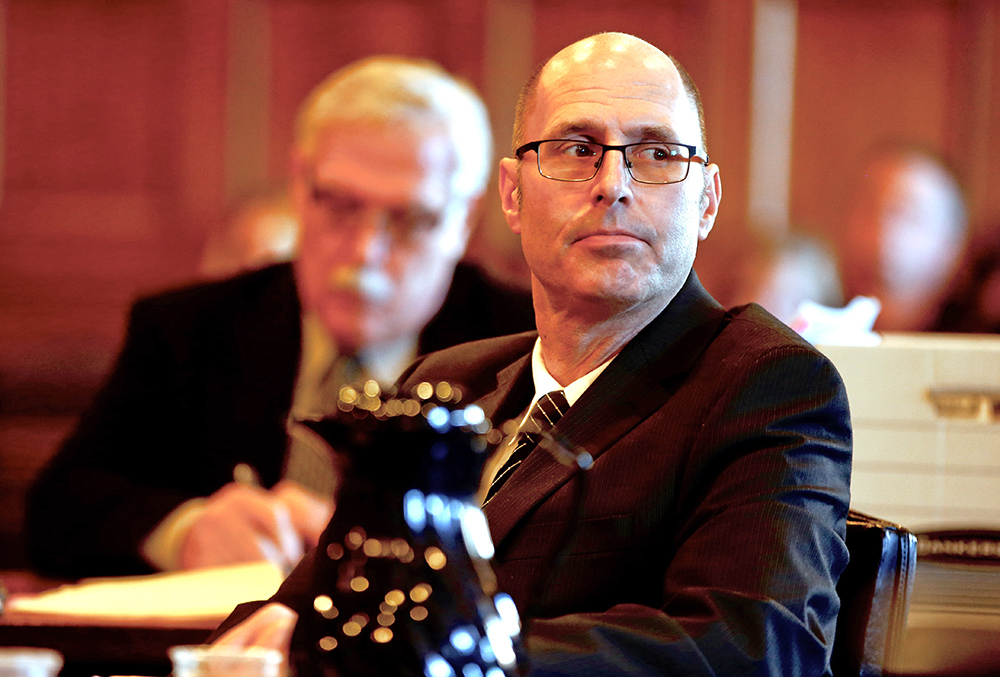Superior Court Justice Thomas Warren is scheduled to issue a verdict Friday in the case against Gregory Nisbet, a Portland landlord facing manslaughter charges stemming from an accidental fire two years ago that killed six young adults.
Nisbet is facing one manslaughter charge for each victim of the fire at 20-24 Noyes St. early on Nov. 1, 2014. The 51-year-old landlord also was prosecuted for five code violations.
If convicted, Nisbet will be the first landlord in Maine to be found guilty of manslaughter, punishable by up to 30 years in prison and a $50,000 fine, for an accidental fire.
Nisbet waived his right to a jury trial, leaving his fate in Warren’s hands.
Juries often reach verdicts within hours or a day or two of closing arguments, but Warren’s verdict comes two weeks after the end of Nisbet’s trial in Cumberland County Superior Court. That’s not unusual in a bench trial like this, said E. James Burke, a professor at the University of Maine School of Law.
“This is a very big case,” Burke said. “I think what we are seeing is the degree of care and seriousness the court puts into deciding big cases. … The judge wants to make darn sure he gets it right, so he’s going to take the time he needs to get it right, and that’s a good thing.”
The Noyes Street fire started in a plastic cigarette butt receptacle on the front porch. It quickly spread through the house after Steven Summers, who was visiting a friend, opened the front door to escape, allowing air to fan the flames. He died of his burns days later.
Among the victims were tenants David Bragdon Jr., 27, Ashley Thomas, 26, and Nicole Finlay, 26. Summers, 29, of Rockland, Maelisha Jackson, 23, of Topsham and Christopher Conlee, 25, of Portland, who were visiting the house for a Halloween party, also died.
The trial, which began on Oct. 3, attracted widespread attention. Family members and friends of the six victims said they want to see Nisbet held accountable. Many landlords say that Nisbet was not to blame and that the charges set a bad precedent.
The court heard testimony from survivors who described frantic efforts to escape as smoke and heat quickly spread and fire blocked the front entrance of the three-story building. Two of the three survivors described their escape out a second-floor window because a rear stairwell was blocked by a former tenant’s belongings.
Rockland resident Paul Garrido testified that he heard two women screaming on the third floor, where two bedrooms and a bathroom were renovated without a permit. State prosecutors say Thomas, Finlay and Conlee could not get out because the third-floor bedrooms lacked a secondary way to escape the building.
ROOMING HOUSE ISSUE
A key legal issue facing Warren is whether Nisbet was running 20 Noyes St. as a rooming house, which would have required sophisticated fire prevention systems, such as a fire alarm system that could be activated manually, an enclosed stairway that would slow an advancing fire and self-closing fire doors. The state has also charged Nisbet with a code violation for allegedly not having a secondary means of escape from the third floor.
Defense attorneys Matthew Nichols and Sarah Churchill argued that 20 Noyes St. was a single-family apartment based on Portland city code that defines a family as up to 16 unrelated people sharing an apartment. They also argued that the fire moved so quickly and burned with such intensity that it would have disabled any functioning smoke detectors before they could sound.
Former tenants testified that smoke detectors were removed by occupants because they kept going off and that they never informed Nisbet. They also said it was their responsibility to clear trash and other debris off the front porch.
But Assistant Attorneys General John Alsop and Bud Ellis argued that Nisbet turned a blind eye to safety issues after he stopped making mortgage payments in 2011, allowing the property to deteriorate while continuing to collect rent. He stopped using leases and began renting out individual rooms without conducting walk-throughs with new tenants and inspecting smoke detectors, they said.
After closing arguments on Oct. 7, both sides provided written opinions to Warren about how the law should be interpreted in the case. Warren said the filings were the equivalent of jury instructions.
‘CULPABLE STATE OF MIND’
Nichols argued the court could not conclude that Nisbet was criminally negligent and reckless simply because there were code violations in his building. Nisbet would have had to receive a formal warning or citation from the city about any code violations, which did not occur, Nichols said.
Ellis, however, said prosecutors do not need to prove a so-called “culpable state of mind,” because it is a landlord’s responsibility to understand code requirements. He also addressed a suggestion by the defense that Nisbet was not the rightful owner of the property because it was under foreclosure. Nisbet was the legal owner until the period of redemption expired, which would have occurred a month after the fire.
Landlords have pleaded guilty to manslaughter cases stemming from accidental fires in New York and Rhode Island, but not in Maine.
Two landlords in Maine have faced manslaughter charges, but were not convicted. The state dropped a case against a Lewiston landlord, whose building allegedly had 23 code violations when it caught fire in 1997 and killed a 26-year-old man and his 3-year-old son and 1-year-old daughter. A Massachusetts-based landlord pleaded guilty to a lesser charge of reckless conduct for a 2006 fire in Biddeford, which killed a 3-year-old boy who was playing with matches in an illegally built apartment with only one exit.
Send questions/comments to the editors.




Comments are no longer available on this story